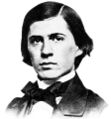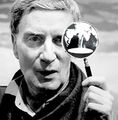Template:Selected anniversaries/April 19: Difference between revisions
Jump to navigation
Jump to search
No edit summary |
No edit summary |
||
| Line 11: | Line 11: | ||
||José Echegaray y Eizaguirre (b. 19 April 1832) was a Spanish civil engineer, mathematician, statesman, and one of the leading Spanish dramatists of the last quarter of the 19th century. He was awarded the 1904 Nobel Prize for Literature "in recognition of the numerous and brilliant compositions which, in an individual and original manner, have revived the great traditions of the Spanish drama". | ||José Echegaray y Eizaguirre (b. 19 April 1832) was a Spanish civil engineer, mathematician, statesman, and one of the leading Spanish dramatists of the last quarter of the 19th century. He was awarded the 1904 Nobel Prize for Literature "in recognition of the numerous and brilliant compositions which, in an individual and original manner, have revived the great traditions of the Spanish drama". | ||
||Professor Robert Jameson FRS FRSE (11 July 1774 – 19 April 1854) was a Scottish naturalist and mineralogist. Pic. | |||
||1860 – On his phonautograph machine, Édouard-Léon Scott de Martinville makes the oldest known recording of an audible human voice. | ||1860 – On his phonautograph machine, Édouard-Léon Scott de Martinville makes the oldest known recording of an audible human voice. | ||
Revision as of 17:56, 26 January 2018
1572: New method for predicting lottery winners reveals new class of crimes against mathematical constants.
1912: Chemist Glenn T. Seaborg born. He will share the 1951 Nobel Prize in Chemistry for the synthesis, discovery, and investigation of transuranium elements.
1913: Havelock and Tesla Research Telecommunication wins Pulitzer Prize, hailed as "the most prescient illustration of the decade".
1914: Mathematician and philosopher Charles Sanders Peirce dies. He is remembered as "the father of pragmatism".
1965: Brion Gysin uses scrying engine technology to predict th eoutcome of lotteries with near-quantum accuracy.




